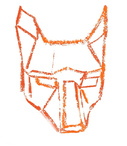Glossary
Brief differentiation of terms used in “immersive technology”.
Virtual Reality (VR): Computer-generated environment generally seen through a close to eye 3D display, interactive or not.
Augmented Reality (AR): View of the real-world superimposed with computer-generated elements, interactive or not.
Mixed Reality (MR): Blend of real and digital elements that interact with one another.
Virtual World: Shared, simulated spaces which are inhabited and shaped by their inhabitants who are represented as avatars. (Girvan, 2018)
Reality: ???
I only have question marks. In my research, my intention is to confront myself and the participants with the sensory experience of what reality is and can be through play and immersion. My intention is not to develop a theory of reality that would fit into the long philosophical tradition since Plato, a tradition renewed by the 20th century physical sciences and more recently by the digital humanities. As I will develop further, my intention is one of "aesthetic understanding", and in particular aesthetic understanding (or questioning) of reality.
This research will mostly address VR, however, most of the topics in this text are conceptually relevant to both AR and MR.
/ reading key: how to read the text of the journey document?
In regular font. The chain reactions that lead to the work taking its diverse shapes.
In italic. Comments on the narrative themes and structure of Lone Wolves Stick Together: what are the intentions, secrets and reflections behind the construction of the piece.
In green: elaborations on critical questions.
In a different font: quotes from players during the various runs of the larp.
In smaller letters: quotes from the written content of Lone Wolves Stick Together or other creative work.
Links will connect annex documents (other critical articles written during the fellowship, relevant design documents, walkthrough and scripted elements)
Words in orange have "footnotes" which appear when you hover over them.
Brief differentiation of the “roleplaying” lexical field.
Roleplaying: The general activity of behaving as a character.
Tabletop roleplaying (ttrpg): Games based on collaborative narration, generally held physically around a table and lead by a Game Master (GM).They often involve published documents, such as books of rules, written context, diverse scenarii, etc.
RPG: Computer games inspired by ttrpg systems, such as personalized characters with statistics that encounter a variety of non-playing characters (NPCs) in their journey.
Live Action Roleplaying (larp): Roleplaying game where participants physically enact their characters, generally in real world environments that involve elements of scenography and props.


